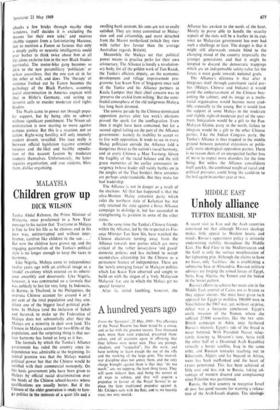Children grow up
MALAYSIA DICK WILSON
Tunku Abdul Rahman, the Prime Minister of Malaysia, once proclaimed in a New Year message to his nation that 'Everyone in Malaya is free to live his life as he chooses and in his own way, uninterrupted and without inter- ference, carefree like children in the sun . . But now the children have grown up, and the engaging paternalism of the Tunku's political style is no longer enough to keep the races in harmony.
Like Nigeria, Malaya came to independence twelve years ago with an artificial image as a 'model' ex-colony which entered on its inherit- ance smoothly and decorously. Like Nigeria, however, it was constructed on a formula that was unlikely to last for very long. In Indonesia, in Burma, in Thailand, in the Philippines, the overseas Chinese account for around 4 or 5 per cent of the total population and they con- stitute one of the biggest local political prob- lems. In Malaya (and the inclusion of Sabah and Sarawak to make up the Federation of Malaya does not substantially alter this) the Malays are a minority in their own land. The Chinese in Malaya account for two-fifths of the population, and the surprising thing is that sur- face harmony has lasted as long as it has.
The formula by which the Tunku's Alliance government has ruled the country since in- dependence was admirable at the beginning. Its central premise was that the Malays wanted political power but that the Chinese would be satisfied with their commercial monopoly. On this basis government jobs have been given to Malays by official racial discrimination over the heads of the Chinese school-leavers whose qualifications are usually better. But if -the Chinese of the older generation is ready to fore- go politics in the interests of a quiet life and a swelling bank account, his sons are not so easily satisfied. They are more committed to Malay- sian soil and citizenship, and more detached from the Maoist motherland (which they view with rather less favour than the average Australian regards Britain).
Meanwhile the Malays see that political power means in practice perks for their own aristocracy. The Alliance is hardly a revolution- ary body, for all the golden work of Tun Razak, the Tunku's efficient deputy, on the economic development and village improvement pro- gramme. Lee Kuan Yew of Singapore once said of the Tunku and his Alliance partners in Kuala Lumpur that their chief concern was to 'preserve the orchid from wilting.' But the semi- feudal atmosphere of the old indigenous Malaya has long been doomed.
The unwise parade by the Chinese-dominated opposition parties after last week's elections proved the spark for the conflagration. Even then it might have been contained, but for a second signal failing oa the part of the Alliance government: namely its inability to accept or to live with opposition. It tends to see in every Malay politician outside the Alliance fold a dangerous threat to the nation's racial harmony, and in every Chinese a Mao Tse-tung. Given the fragility of the racial balance and the still green memories of the earlier communist in- surgency (whose leader still vainly battles on in the jungles of the Thai border), these anxieties are perhaps understandable. But they make for bad leadership.
The Alliance is not in danger as a result of the elections. All that has happened is that the ultra-Moslem Malay extremist party which
rules the northern state of Kelantan has not only retained the state against a fierce Alliance campaign to dislodge it, but has succeeded in
strengthening its position in some of the other states.
At the same time the Tunku's Chinese friends within the Alliance, led by the respected ex-Fin- ance Minister Tan Siew Sin, have watched the Chinese electorate turning away from the Alliance towards new parties which are more critical of the rather laissez-faire 'old guard' domestic policies and less inclined to accept second-class citizenship for the Chinese as a permanent feature of independence. These are the 'newly emerging forces' in Malayan politics which Lee Kuan Yew observed and sought to build on with the slogan of a 'truly Malaysian Malaysia' (i.e. one in which the Malays get no special favours).
After its initial fumbling, however, the
Alliance has awoken to the needs of the hour. Merely to prove able to handle. the security aspects of the riots will be a feather in its cap, since no Malaysian government has ever had such a challenge to face. The danger is that it might still afterwards remain blind to the changing mood of the country (especially the younger generation), and that it might be tempted to discard the democratic trappings which are an indispensable safety-valve for the forces it must guide towards national goals.
The Alliance's dilemma is that after it integrates itself through constituent racial par- ties (Malays, Chinese and Indians) it would avoid the embarrassment of the Chinese boy- cotting the cabinet, and its image as a multi- racial organisation would become more cred- ible. especially to the young. But it would lose the support of some Malays in the moderate and slightly right-of-moderate part of the spec- trum. Integration would be a gift to the Pan- Malayan Islamic party in the north, failure to integrate would be a gift to the other Chinese parties. Like the Indian Congress party. the Tunku's Alliance is thus trapped in the middle ground between potential extremists or politi- cally more ideological opposition parties. There is no reason short of an unexpected further loss of nerve to expect more disorders for the time being. But unless the Alliance consolidates itself quickly, the combined weight of racial and political pressures could bring the cauldron to the boil again in another year or two.






































 Previous page
Previous page